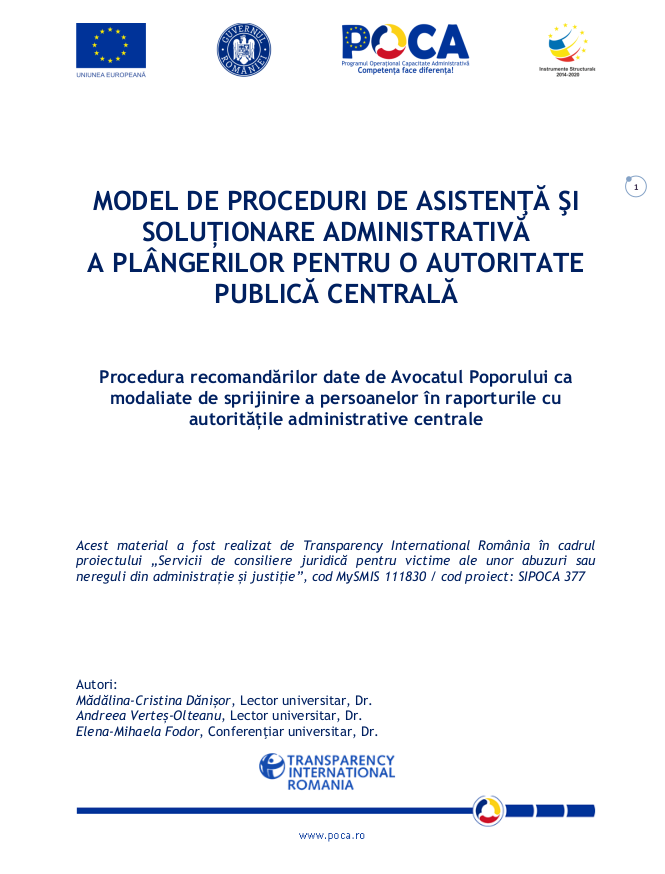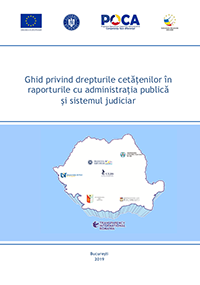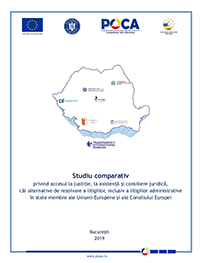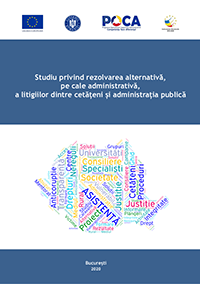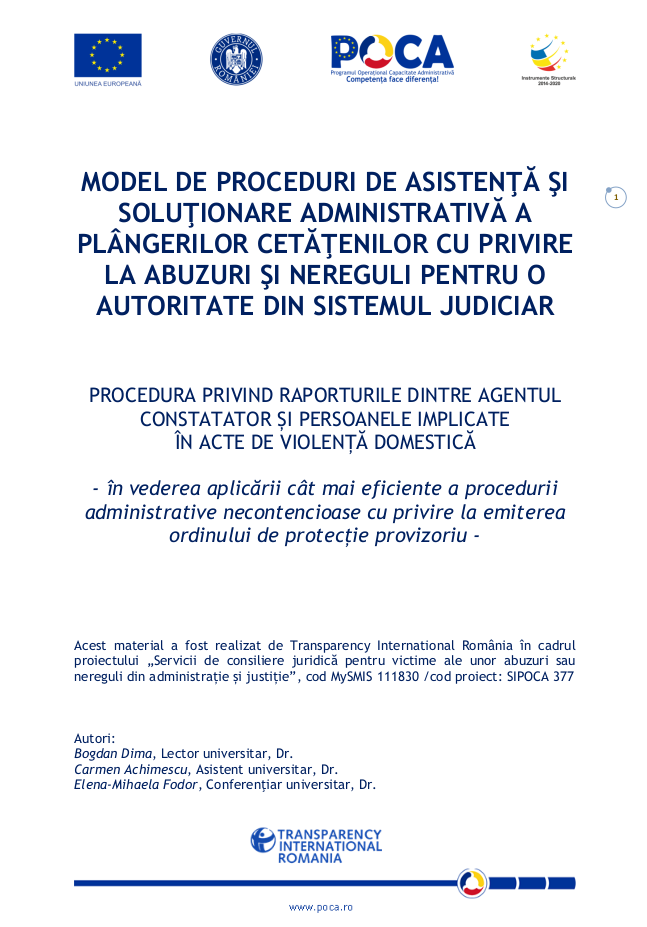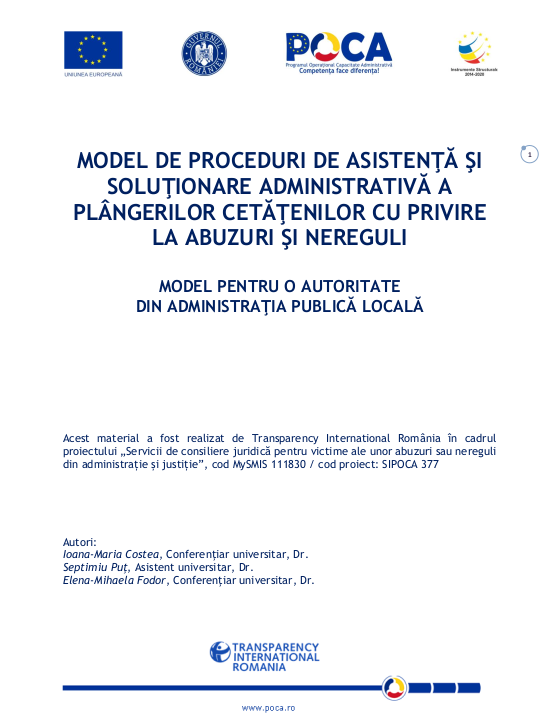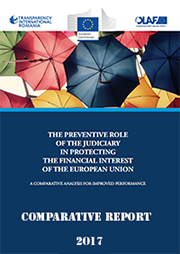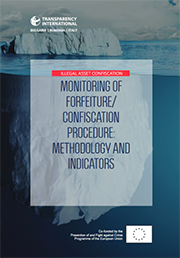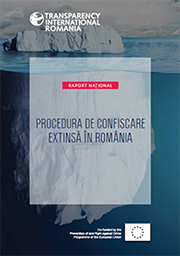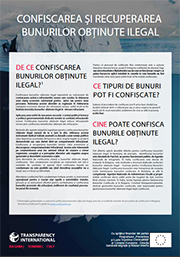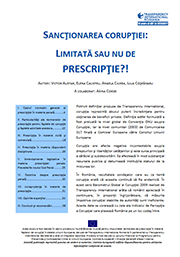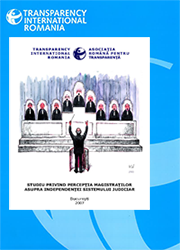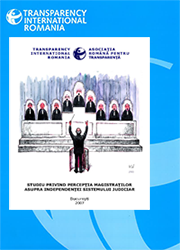This research is part of the commitment assumed by the Government of Romania at the prompting of the European Commission, to monitor progress in the field of justice reform..
Several research instruments were used - focus groups, opinion polls, media monitoring and comparative analyses of legislation and public policies, so as to accomplish valuable studies and obtain an accurate reality-based picture.
All instruments have been symetrically applied to the following beneficiary pre-established theme range:
- Judiciary independence
- Input sources and the nature of pressures onto the justice system
- Situations which can impede on the independence of the justice system
- Highlighting the dysfunctions and weak point of the justice system
- Legal guarantees and measures tailored to ensure genuine independence and the protection of magistrates from the possible risks associated with the fulfilling of their jurisdictional duties
The interpretation of the data obtained in the Studies does not necessarily represent the research team' choice of the optimum way to ensure the independence of the justice system, but rather the impartial interpretation of the perception data.
The Studies do not provide a diagnostic analysis of the judiciary system; the instruments and methodology are distinct from that case.
The Studies are organized so as to integrate the topic-based data, and not the results of each research instrument. Thus, those who will use the Studies as part of their research will not fiind separate conclusions for each of the focus groups, surveys or media monitoring instruments In 2005 and 2006, TI Romania accomplished the two editions of the Study of magistrates' perceptions regarding their professional independence as well as the causes and circumstances which negatively or positively influence the independence of the judiciary.
This is the third edition of this study and it can be used as a basis for the analysis of the information related to the indicators for 2005, 2006 and 2007. The evolution of the magistrates' perception of the independence of the judiciary system is relevant for the validation, or invalidation thereof, of relevant public policies which are part of the reform of the judiciary system.
The current edition contains the perceptions of magistrates a year after the passing of Law 247/2005 and almost 3 years after the passing of the 3-law package regulating the judiciary system.
The conclusions of the Study show a high potential for the analysis of the progresses recorded by the two studies, and they will constitute the analysis basis for the drawing up of proposals to improve reform policies.
In order to access the full content of the Study press here. (romanian version)
This is the second edition of this study and it can be used as a basis for the analysis of the information related to the indicators for 2005 and 2006. The evolution of the magistrates' perception of the independence of the judiciary system is relevant for the validation, or invalidation thereof, of relevant public policies which are part of the reform of the judiciary system.
The current edition contains the perceptions of magistrates a year after the passing of Law 247/2005 and almost 2 years after the passing of the 3-law package regulating the judiciary system.
The conclusions of the Study show a high potential for the analysis of the progresses recorded by the two studies, and they will constitute the analysis basis for the drawing up of proposals to improve reform policies.
In order to access the full content of the Study press here.
The study is of utmost importance, from two points of view: on the one hand, the Romanian judiciary system has not so far undergone an evaluation of the magistrates' perception of the independence or lack of independence of the system; and, on the other hand, the conclusions of the study show a substantial potential for the drawing up of reform policies based on "source-information".
A special emphasis was laid on the functional relationsips inside the justice system; also on the balance of state powers, especially on the relationship that the judiciary power has with the executive, the political and "civilian" powers.
The Study aims to highlight the perceptions of magistrates regarding the independence of the judiciary system as seen from inside the system, without attempting to soften or compromise the positions shown by magistrates with those of external opinion-shapers such as the mass media, NGO's, political leaders or international organizations.
In order to access the full content of the Study, press here.
In the elaboration of the procedure, the Ombudsman Institution was chosen as a model of analysis, given the fact that it has a double perspective. The Ombudsman is a central public institution that generally seeks the correct implementation of legislation by public administration authorities concerning individuals. To fulfil its attributions, it carries out a series of procedures that are described by the legislation in force and must be used in full according to the purpose considered by the legislator.
• General context on respect for fundamental rights and access to justice • Public legal aid • Other forms of legal assistance or advice provided by the state for vulnerable persons • Forms of legal assistance or advice provided by local public authorities for vulnerable persons • Forms of assistance or legal advice provided by private organizations for vulnerable people • Access to justice and alternative means of resolving conflicts • The main alternative ways of resolving disputes: The actual legislative framework • Main ways of resolving administrative disputes.
Complaints and appeals made by citizens
Legal analysis of doctrinal legislation
Citizens' relationship with local public administration institutions and with the decentralized services of the central public administration
The right of the person injured by a public authority
Law enshrined in the Romanian Constitution and special laws
Analysis of case law on complaints and mandatory procedures for filing a request in administrative litigation • Hindrance of access to administrative litigation courts
Legislative issues related to the hindrance of access to administrative litigation courts: mandatory prior administrative complaint (pardon); stamp duties
Analysis of the jurisprudence of the European Court of Human Rights (ECHR) and the Constitutional Court of Romania on access to justice in Romania.
The procedure is intended to be a model procedure for assisting and administratively resolving citizens' complaints about abuse and irregularities for judicial authority.
This model aims to provide a summary of the general procedural rules related to the solution of complaints, as well as examples of good practice. At the same time, the model also provides a summary of regulations in the main areas of competence of local government authorities, with comments and explanations. Specific examples of good practice for preventing the violation of individuals' rights or resolving their complaints are also presented.
The preventive role of judiciary in protecting the financial interest of the European Union – a comparative analysis for improved performance
Enhancing integrity and effectiveness of illegal asset confiscation - European approaches
The report identifies vulnerabilities in current legislation and provides recommendations.
Comparative report at the level of three EU member states - Romania, Bulgaria and Italy - on legal and institutional practices in the confiscation procedure, with emphasis on efficiency and integrity.
Analysis of the legislation and context of the operation of the prescription of corruption offenses in a set of analyzes carried out at the level of 12 EU Member States.
The study assesses the magistrates' perception of the level of professional independence, as well as on the causes and circumstances that could negatively or positively influence the independence of the judiciary. This research serves as a basis for adopting effective measures to strengthen independence and the responsibility of the magistrates and to eliminate the negative aspects of the Romanian justice system.
The study assesses the magistrates' perception of the level of professional independence, as well as on the causes and circumstances that could negatively or positively influence the independence of the judiciary. This research serves as a basis for adopting effective measures to strengthen independence and the responsibility of the magistrates and to eliminate the negative aspects of the Romanian justice system.
Assessing the perception of magistrates on the independence of the judiciary to adopt effective measures to strengthen the independence and the responsibility of magistrates and eliminating the negative aspects of the Romanian justice system.

